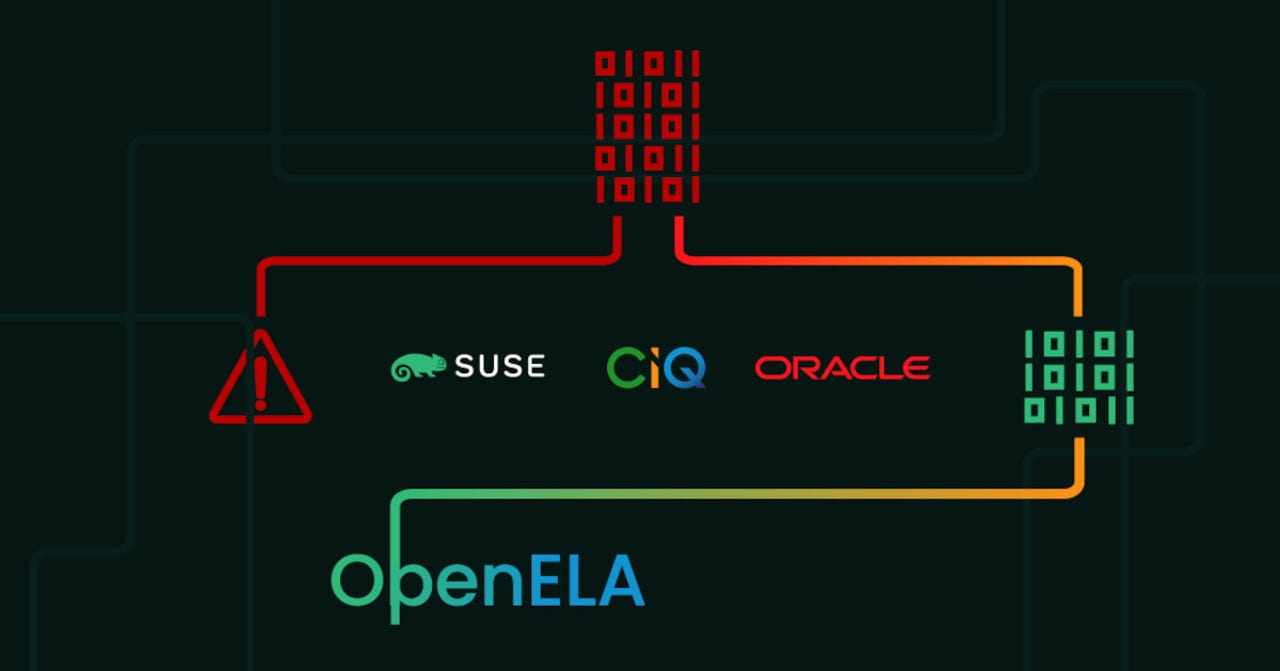
In a groundbreaking move, CIQ, Oracle, and SUSE have come together to announce the formation of the Open Enterprise Linux Association (OpenELA). The goal of this new collaborative trade association is to foster “the development of distributions compatible with Red Hat Enterprise Linux (RHEL) by providing open and free enterprise Linux source code.”
The inception of OpenELA is a direct response to Red Hat’s recent alterations to RHEL source code availability. This new Delaware 501(c)(6) US nonprofit association will provide an open process for organizations to access source code. This will enable it to build RHEL-compatible distributions. The initiative underscores the importance of community-driven source code, which serves as a foundation for creating compatible distributions.
Also: Why don’t more people use desktop Linux? I have a theory you might not like
Mike McGrath, Red Hat’s vice president of Red Hat Core Platforms, sparked this when he announced Red Hat would be changing how users can access RHEL’s source code. For the non-Hatters among you, Core Platforms is the division in charge of RHEL. McGrath wrote, “CentOS Stream will now be the sole repository for public RHEL-related source code releases. For Red Hat customers and partners, source code will remain available via the Red Hat Customer Portal.”
This made it much more difficult for RHEL clone vendors, such as AlmaLinux, Rocky Linux, and Oracle Linux, to create perfect RHEL variant distributions. AlmaLinux elected to try to work with Red Hat’s new source code rules. Oracle restarted its old fighting ways with IBM/Red Hat; SUSE announced an RHEL-compatible distro fork plan; and Rocky Linux found new ways to obtain RHEL code. Now the last two, along with CIQ, which started Rocky Linux, have joined forces.
Thomas Di Giacomo, SUSE’s Chief Technology and Product Officer, emphasized the significance of collaboration in driving innovation. He stated, “Collaboration is critical to fostering innovation, which is why we welcome everyone to be part of this association and help us uphold open community standards.” Gregory Kurtzer, CIQ’s CEO, echoed this sentiment, marking the announcement as the beginning of a new era for Enterprise Linux.
Also: Linux has over 3% of the desktop market? It’s more complicated than that
According to the association, OpenELA is not just about providing open-source code. It’s about upholding the spirit of open source and ensuring continuity for all Enterprise Linux downstream distributions. “Many large organizations reached out to us to express the importance of community-driven source code for EL that can act as a starting point for compatible distributions,” added Wim Coekaerts, Oracle executive VP of software development, “OpenELA is our response to this need.”
SUSE CEO Dirk-Peter (DP) van Leeuwen, added, “We’re determined to make choice happen. The Open Enterprise Linux Association aims to give us all open access to source code that will bring the industry together. At the same time, we’re committed to continuing our first-class support for SUSE Linux Enterprise. Our conviction is that our customers should be free to decide what works for them.”
The OpenELA will only be producing source code. It will not produce its own binary distribution. The members, and anyone wanting to try it, can create their own EL-compatible distributions from the code.
Also: The best Linux laptops
Specifically, the OpenELA will be delivering the following by year’s end.
- All sources necessary to achieve a 1:1 / bug-for-bug compatible version of EL This will be distributed via Git, encouraging community collaboration
- Security errata data
- Compatibility guidelines for downstream distributions to test their build results
- A branding kit for all downstream distributions and supporters
- User and Administration Documentation (Oracle contribution)
OpenELA will provide sources necessary for RHEL-compatible downstreams to exist, with an initial focus on RHEL versions 8, 9, and possibly EL7. The project is committed to indefinitely ensuring the continued availability of OpenELA sources to the community.
Also: The best Linux distros for beginners
As Kurtzer explained, “At this point, the goal of OpenELA is to focus on providing sources from where vendors can download and build their own distro. Community members like Rocky Linux and others will continue producing distros like before.”
He added, “From the Rocky and CIQ side, it is important to remember that while CIQ is supporting this effort to ensure the longevity of all Enterprise Linux distributions, Rocky Linux and the Rocky Linux Enterprise Software Foundation (RESF) is a separate entity and the decision and announcement of that is pending their board of directors.”
The association claims its mission revolves around offering a secure, transparent, and reliable Linux source that’s accessible globally. OpenELA’s core tenets reflect its commitment to transparency, community inclusivity, and public benefit. It aims to provide a consistent and secure upstream location for all interested in Enterprise Linux distribution sources.
Also: Fedora Linux on M-powered Macs will be here shortly
The initial OpenELA board of directors will include equal representation from its founding entities, CIQ, Oracle, and SUSE. The group will also welcome other organizations and community members to help “to build a robust, community-driven standard that ensures impartiality and equilibrium in the RHEL ecosystem.”
Check here for how to get involved and join OpenELA via e-mail and Slack.
And, what does Red Hat make of this? McGrath told me:
In our view, ‘enterprise Linux’ isn’t an implementation standard; it goes beyond the bits to encompass the expertise, support, and engineering that backs an operating system. This is what makes Red Hat Enterprise Linux an enterprise-level Linux product. We’re proud to employ many of the talented minds driving innovation across not just Linux, but open source in general, advancing upstream projects and enterprise applications in tandem. We have always welcomed ongoing contributions to the broader Linux community, whether personally motivated or from companies like Oracle and SUSE, that actually move enterprise-level Linux forward rather than replacing one logo with another.




















